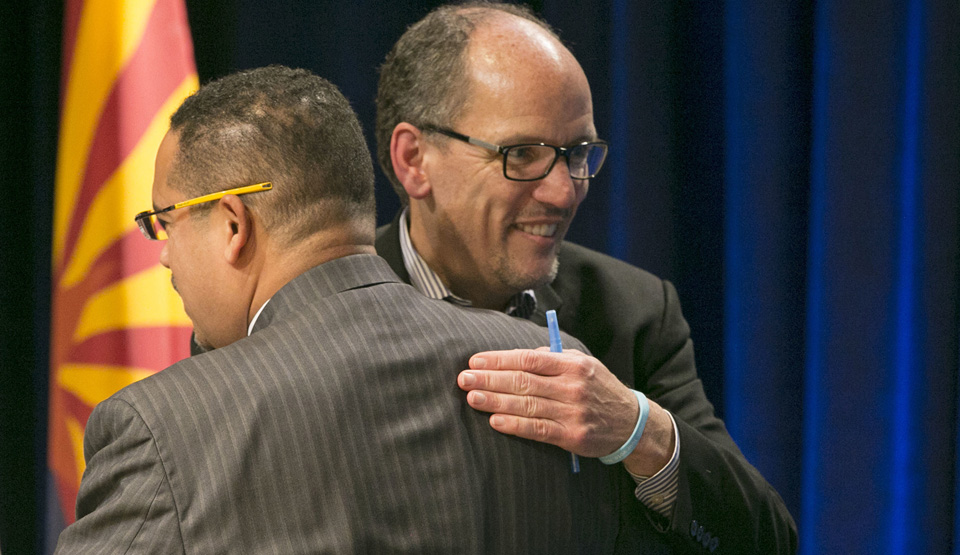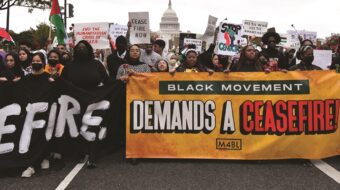
As they meet in Atlanta this weekend to elect a new chairperson, the 447 members of the Democratic Party’s National Committee (DNC) face two facts: On the one hand, their party has little influence in national or state policy-making. Republicans control all three branches of government and 24 states. What’s worse, Republicans – at present – have locked up the process of redistricting, which potentially gives them the power to set in stone their control of the House.
On the other hand, as nationally syndicated columnist E.J. Dionne puts it, millions of people have been pushed into activism for the first time “by the sense of emergency this dreadful administration has created.”
This resistance movement is as diverse as it is vast.
Many of the resistance leaders come from the Bernie Sanders’ presidential campaign and all eight candidates for the DNC chair have acknowledged that the movement is fueled by the hope and enthusiasm created by Sanders’ repeated assurance that if “millions and millions of people get together, we can take the country back from the billionaires.”
The question facing the DNC members is: who can best lead the effort to channel the momentum of the new activism into winning elections? Especially, as Dionne reminds us, “A political party should not get in the way of a spontaneous and principled uprising rooted in so many movements across civil society.”
Party leaders have already taken the first step toward becoming part of the explosion of progressive activism while not narrowing its focus.
They have appointed Bernie Sanders as “director of outreach.”
The two leading candidates for DNC chair – former Secretary of Labor Tom Perez and U.S. Representative Keith Ellison (Minn.-5) – share the view that the party should – and can – correct mistakes that were made during the presidential election.
Clinton lost, Dionne points out, because “she underperformed in three ways: Democratic base turnout was a bit lower than it should have been; working-class white defections were slightly higher than her campaign expected; and she did not do quite as well as she hoped with upscale whites.”
Perez says “What voters heard [from Clinton] was ‘Vote for me because he’s crazy.’ I will stipulate to the accuracy of that statement, but that’s not an affirmative message.”
Ellison says “This election cycle, Democrats failed to motivate enough people to show up at the ballot box. Since 2008, Democrats have lost some 935 legislative seats and Republicans now control two thirds of governors’ offices. It’s time for a change.”
Both candidates agree that the best way to rebuild the party is from the ground up, putting resources into winning races at all levels, starting with school boards and city councils. In Perez’s words, “to make sure the endeavor is a 12-month enterprise, not just a three-month enterprise before the election. … Most of all, we need to listen. We need to listen to Democrats at every level, empowering them to fight for progressive values and a vision of opportunity and optimism”
Ellison puts it this way: “[We must] engage with progressive allies in party rebuilding, including … constituency outreach, and grassroots mobilization … . “[And we must] build meaningful relationships with the labor community as a strategic and tactical partner in the fight for the interests of working people.”
Furthermore, says Ellison, “We must energize Democratic activists across the country and give them the tools to build the Party from the bottom up. We need a 3,143-county strategy.” (Rather than the strategy of putting most resources into “swing” locations and shortchanging those areas deemed to be impossible to win or to be in the bag. One of the problems faced by the Clinton campaign was that many places anticipated to be wins were not.)
Perez and Ellison have a lot in common. Both have been effective advocates for minority rights and civil rights. Both have close ties to the labor movement. The election of either one would send a clear message across the nation: the Democratic Party will not tolerate racism or xenophobia. Ellison is a Muslim, Perez is Hispanic and the son of immigrants.
The difference between them is subtle. Whereas they both have long histories of government service, Perez has mostly been an appointee while Ellison has had to campaign on the ground for re-election every two years.
Perez did successfully campaign for a seat on the Montgomery County, Maryland County Council, but was quickly appointed by then-Gov. Martin O’Malley to be the state’s equivalent of Secretary of Labor. Soon after that, he served as head of the U.S. Department of Justice’s Civil Rights Division and then as Secretary of Labor in the Obama Administration.
Ellison has successfully run for office since 2002, first for a seat in the Minnesota legislature and then for a seat in Congress. He has often won by record-breaking landslides.
The AFL-CIO has endorsed Ellison, as well as most – but not all – labor unions.
AFL-CIO President Richard Trumka and Maria Elena Durazo, a vice chair of the Democratic National Committee and a general vice president of UNITE HERE, wrote in the Huffington Post:
“Keith [Ellison] knows how to win elections, and has a track record of defeating anti-worker forces wherever they are. … And … he’s been getting pro-worker candidates elected from the school board to the U.S. Senate … He understands that many working people voted for Donald Trump because the Democratic Party didn’t make a compelling enough case. … With Keith at the helm of one of America’s two major political parties, working people will be in a much better position to have our issues advanced and our concerns heard.”
However, The International Association of Firefighters, the International Longshore and Warehouse Union (ILWU), the United Farm Workers and the United Food and Commercial Workers (UFCW) all came out in support of Perez.
UFW President Arturo Rodriguez said “[Perez] has been a lifelong friend of labor and immigrants. When farm workers needed him, Tom Perez stood up and fought.”
ILWU International President Robert McEllrath said in a statement, “Tom Perez helped the ILWU at a critical time in our negotiations … I maintain the utmost respect for … Congressman Keith Ellison of Minnesota, … but my personal experience seeing Tom Perez work hard to solve problems for my union’s membership is what makes this the right decision for me.”
As of this writing, who will win for DNC chair is anybody’s guess. Furthermore, although Perez and Ellison are going to the Atlanta meeting as the candidates to beat, exactly that might happen.
For example, according to Dionne, “Pete Buttigieg, the 35-year-old mayor of South Bend, Indiana, has made a name for himself by promising a “fresh start” … in the eight-person field, Buttigieg seems to have the best chance of emerging as the alternative if neither Perez nor Ellison wins early.”
One thing is certain: although all the contenders for chairperson of the DNC may have started their campaigns by dissecting the 2016 presidential race, all are now focused on plans for winning elections so that Democrats can place pro-worker, pro-equality, pro-justice legislation and programs at the forefront of all levels of government.
And all are convinced that the way to rebuild the Democratic Party is to work closely with today’s broad, diverse and sprawling movements that are united in their resistance to the Trump regime.












Comments